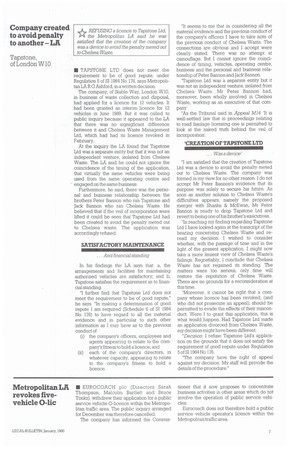Company created to avoid penalty to another LA
Page 9

If you've noticed an error in this article please click here to report it so we can fix it.
Tapstone, of London W10
REFUSING a licence to Tapstone Ltd, 1"1 the Metropolitan LA said he was satisfied that the creation of the company was a device to avoid the penalty meted out to Chelsea Waste.
• TAPSTONE LTD does not meet the requirement to be of good repute, under Regulation 5 of SI 1984 No 176, says Metropolitan LA R G Ashford, in a written decision.
The company, of Stable Way, London W10, in business of waste collection and disposal, had applied for a licence for 12 vehicles. It had been granted an interim licence for 12 vehicles in June 1989. But it was called to public inquiry because it appeared to the LA that there was no signigficant difference between it and Chelsea Waste Management Ltd, which had had its licence revoked in February.
At the inquiry the LA found that Tapstone Ltd was a separate entity but that it was not an independent venture, isolated from Chelsea Waste. The LA said he could not ignore the coincidence of the timing of the application, that virtually the same vehicles were being used from the same operating centre and engaged on the same business.
Furthermore, he said, there was the personal and business relationship between the brothers Peter Bannon who ran Tapstone and Jack Bannon who ran Chelsea Waste. He believed that if the veil of incorporation were lifted it could be seen that Tapstone Ltd had been created to avoid the penalty meted out to Chelsea waste. The application was accordingly refused.
SATISFACTORY MAINTENANCE . . And financial standing In his findings the LA says that: a, the arrangements and facilities for maintaining authorised vehicles are satisfactory; and b, Tapstone satisfies the requirement as to financial standing.
"I further find that Tapstone Ltd does not meet the requirement to be of good repute," he says. "In making a determination of good repute I am required (Schedule 6 of SI 1984 No 176) to have regard to all the material evidence and in particular to such other information as I may have as to the previous conduct of (i) the company's officers, employees and agents appearing to relate to the company's fitness to hold a licence; and (ii) each of the company's directors, in whatever capacity, appearing to relate to the company's fitness to hold a licence. "It seems to me that in considering all the material evidence and the previous conduct of the company's officers I have to take note of the previous conduct of Chelsea Waste. The connections are obvious and I accept were clearly stated. There was no attempt at camouflage. But I cannot ignore the coincidence of timing, vehicles, operating centre, business and the personal and business relationship of Peter Bannon and Jack Bannon.
"Tapstone Ltd was a separate entity but it was not an independent venture, isolated from Chelsea Waste. Mr Peter Bannon had, moreover, been wholly involved in Chelsea Waste, working as an executive of that company
"As the Tribunal said in Appeal MI4: 'It is well-settled law that in proceedings relating to road haulage licensing one is permitted to look at the naked truth behind the veil of incorporation'.
'CREATION OF TAPSTONE LTD . . . Was a device' "I am satisfied that the creation of Tapstone Ltd was a device to avoid the penalty meted out to Chelsea Waste. The company was formed in my view for no other reason. I do not accept Mr Peter Bannon's evidence that its purpose was solely to secure his future. As soon as another solution to Chelsea Waste's difficulties appears, namely the proposed merger with Shanks & McEwan, Mr Peter Bannon is ready to drop Tapstone Ltd and revert to being one of his brother's executives.
"In reaching my finding regarding Tapstone Ltd I have looked again at the transcript of the hearing concerning Chelsea Waste and reread my decision. I wished to consider whether, with the passage of time and in the light of the present application, I might now take a more lenient view of Chelsea Waste's failings. Regrettably, I conclude that Chelsea Waste has not regained its standing. The matters were too serious, only time will restore the reputation of Chelsea Waste. There are no grounds for a reconsideration at this time.
"Moreover, it cannot be right that a company whose licence has been revoked, (and who did not prosecute an appeal), should be permitted to evade the effects of their misconduct. Were I to grant this application, this is what would happen. Had Tapstone Ltd made an application divorced from Chelsea Waste, my decision might have been different.
"Decision: I refuse Tapstone Ltd's application on the grounds that it does not satisfy the requirement of good repute under Regulation 5 of SI 1984 No 176.
"The company have the right of appeal against my decision. My staff will provide the details of the procedure."
















































































































